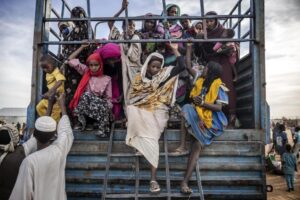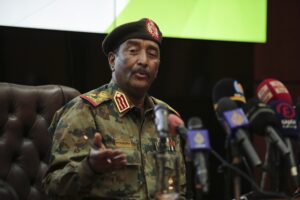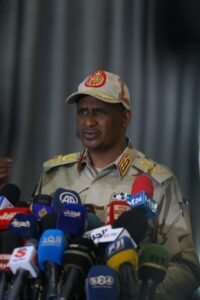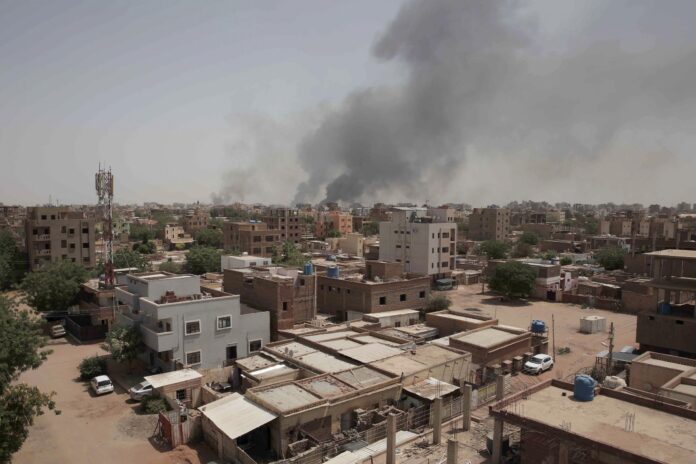By David Pratt
It’s the planet’s biggest humanitarian crisis. Not so much forgotten as one the world seems indifferent too, except those profiting from its creation, writes Foreign Editor David Pratt
There have now been over 500 days of bitter fighting. This is not Ukraine or Gaza I’m talking about here, but Africa’s third-largest country
Sudan. You could almost be forgiven for not knowing that this giant African nation is gripped by one of the worst conflicts seen on the continent for decades, such is the dearth of coverage in much of the media.

As I can attest from personal experience, just like other journalists who have covered African affairs, there is nothing new in this editorial neglect. In part, it stems from the misguided perception that those outside of Africa rarely have any interest in the continent or its people.
Short of pillaging Africa’s vast natural resources at every opportunity, for so long now the prevailing thinking among some in powerful and wealthy nations is that the continent is too distant, too big, too complex, too removed from our own lives for it to really matter.
This, of course, is rarely said out loud, and even if it were, it couldn’t be further from the truth.
Sudan’s devastating conflict is a sharp point in case. For what few perhaps realise is that the country’s size and geopolitical location make it a huge generator for instability that stretches far beyond its borders.

Endre Stiansen, Norway’s ambassador to Sudan, was at pains recently to make that very point, telling The Economist magazine that “this is now a war that is impacting severely on three continents”.
Even for those who bother to pay any attention at all to what’s happening in Sudan, the war there is readily perceived as two ruthless generals, scrapping for control and the spoils of the country.
On the face of it, that’s a pretty accurate summary, or at least it was when the war broke out last April, but since then there’s been so much more to it.
Abdel Fattah al-Burhan, the commander-in-chief of the Sudan Armed Forces (SAF), and Mohamed Hamdan Dagalo, also known as Hemedti, the commander of the paramilitary Rapid Support Forces (RSF) are the two generals in question. Both were once allies in the overthrow of Omar al-Bashir’s 30-year reign in Sudan.
But no sooner had the two men and their respective forces gone to battle with each other, myriad outside proxies lined up behind them to lend support and seize what they could for themselves from Sudan’s crisis.
As it stands, the breakdown as to which country supports which general goes roughly like this.

Behind Burhan and the SAF stand Egypt and Saudi Arabia, and military support from Iran. Meanwhile, behind Hemedti, the United Arab Emirates (UAE) – despite denials – is said by a UN panel of experts to give its support to his RSF paramilitaries that grew out of the notorious Janjaweed, the Sudanese Arab militia group that operates in the country, particularly in the Darfur region.
Vying for influence
Russia, in turn, has played both sides and deployed Wagner mercenaries, while Turkey and Qatar are other bit players vying for influence too. For its part, meanwhile, the West, preoccupied with the conflicts in Ukraine and Gaza, seems to have taken its eye off the geopolitical ball in Sudan, something certain analysts say could come back to bite it strategically.
To begin to understand this strategic importance, it’s worth noting that Sudan borders seven other countries: Libya, Egypt, Chad, the Central African Republic, South Sudan, Ethiopia, and Eritrea.
Five of these neighbours – Ethiopia, Chad, Central African Republic, Libya and South Sudan – have faced political upheaval or conflict themselves in recent years, meaning that the current war in Sudan is fuelled by what a recent Amnesty International report described as “an almost unimpeded supply of weapons”.
So, what lies behind the interests of these proxy backers and what impact is it having on Sudan and its people?
Sitting as it does at the intersection of Africa and the Middle East – that includes a zone on the Red Sea which, at its narrowest point, separates Arabia from Africa by just 30km – Sudan’s importance stems from its location.
This is the gateway to the Sahara, the Sahel, and the Horn of Africa. Although the country has struggled economically for decades, it has resources other countries relish, including minerals, gold, arable land, a long stretch of the Nile and, most significantly, some 800km of coast on the turbulent Red Sea,
It is also part of the Gulf States’ sphere of influence and in the past they have pursued investments in sectors including agriculture and ports.
According to the think tank International Crisis Group ICG), while Egypt is the SAF’s main outside backer providing Turkish made drones, Iran is also providing it with weapons including Mohajer-6 drones helping a recent turnaround on the battlefield.
Meanwhile, on the other side, the UAE is the major patron of the RSF and some analysts say a significant influence on the war. Those who profess to understand the UAE’s motives say it suspects Burhan of being too close to Islamists and sees this as an opportunity to thwart that threat.
Other regional powers have also taken sides, with Eritrea, apprehensive about the RSF advancing further east toward its borders, generally backing Burhan’s SAF, whereas its neighbour Ethiopia, a close ally of the UAE and rival of Egypt, is seemingly friendly to the RSF.
De facto presence
AS for Russia’s involvement, Kornet AT-14 antitank missiles and other Russian weapons have been reported to be in RSF hands. According to the Washington Institute for Near East Policy, the Kremlin has long used the Wagner Group as its de facto presence in Africa, providing protection to mineral extraction projects and taking a share of the profits.
Wagner and its successor organisation, the Africa Corps, have been particularly visible alongside the RSF and some reports including from the NGO Global Witness say Hemedti’s force has seemingly established an informal alliance with Moscow.
That said, Russia might yet choose to switch sides after the SAF said in May it would consider allowing Moscow an outpost in Port Sudan, though “not exactly a military base”, in exchange for fuel and arms.
The geopolitical picture, then, is complex to say the least and Sudan’s war, described recently by The Economist magazine as a “chaos machine”, has an obviously massive capacity to impact widely.
“The war sucks in malign forces from the surrounding region, then spews out instability… as the country disintegrates, it could upend regimes in the Sahel and the Horn of Africa. It could become a haven for terrorists. It could send an exodus of refugees to Europe. And it could exacerbate the crisis in the Red Sea, where attacks by the Iranian-backed Houthis have already contorted global shipping,” the magazine’s analysis concluded.
All this, too, before that fact that millions of Sudanese and others have been affected by what is regarded as the biggest humanitarian crisis on the planet. Just this month, international officials declared that part of Sudan was in a famine – the world’s first since 2017 – with at least 100 people dying of hunger every day.
More than half of the country’s 48 million people are suffering from hunger, while one out of four have been forced from their home. Some have taken refuge in neighbouring countries such as Egypt, but the vast majority of the displaced, nearly eight million, remain inside Sudan, many of them in camps. With the country’s major cities in ruins from fighting between the SAF and RSF, some estimates say as many as 150,000 Sudanese have been killed.
A report released in May by the Dutch international relations think tank the Clingendael Institute estimated that hunger and related diseases would kill more than two million people in Sudan by the end of the year.
The report’s author, Timmo Gaasbeek, has since extended his projections to cover the next two years. In an “optimistic scenario”, in which fighting stops and this year’s harvest, expected in October, is slightly better than the last, he predicts around six million “excess deaths” by 2027.
Mass starvation
In the more likely scenario in which fighting continues until early next year, more than 10 million may perish. Although some experts have lower estimates, there is an emerging consensus that, without decisive action, Sudan faces mass starvation that The Economist magazine concluded may prove the worst anywhere in the world since millions starved to death during China’s Great Leap Forward in the late 1950s and early 1960s.
Writing recently in the London Review of Books, Alex de Waal, executive director of the World Peace Foundation and considered one of the foremost experts on Sudan and the Horn of Africa, noted that perhaps 90% of the hungriest people in Sudan are in the swathes of land controlled by the RSF, in Khartoum, Gezira and Kordofan, but especially in Darfur.
De Waal also described the RSF as “a looting machine, its forces plundering every town and village they occupy, while wantonly destroying public infrastructure, including universities and hospitals”.
Should the RSF prevail in the war, says de Waal, given that for years it has done business with the Russian mercenary group once known as Wagner, then this would make Sudan a “wholly owned subsidiary of a transnational mercenary enterprise”.
Meantime, however, both sides in this war have been accused of atrocities including summary executions, torture and the mutilation of bodies, according to a report released by Human Rights Watch (HRW) last Tuesday.
The report, which analysed videos and photographs posted on social media, detailed instances of mass executions and torture by both sides. It also documented the mutilation of bodies, including a case where SAF soldiers were filmed brandishing severed heads.
“The commanders need to be held to account for failing to prevent or punish these crimes,” said Mohamed Osman, a Sudan researcher at HRW.
As if Sudan’s suffering was not bad enough, this past week scores of people were killed after a dam burst because of heavy rainfall. The Arbat dam has a capacity of 25 million cubic metres and is the main source of drinking water for the giant coastal city of Port Sudan, where the SAF military government is based.
After being ravaged by 16 months of civil war, Sudan is now experiencing torrential rains and floods that have killed dozens and forced tens of thousands from their homes. An estimated 50,000 people have been affected according to the United Nations Office for the Coordination of Humanitarian Affairs.
Dire situation
Yet despite the utterly dire situation, Sudan’s conflict continues to receive scant attention from world leaders and the international community or money for humanitarian aid. Some argue that this conflict is one where it’s hard to blame the West for pulling the political strings.
Among such voices is David Pilling, Africa editor and a columnist at the Financial Times.
“If anything, it is guilty of paying too little attention. While the wars in Gaza and Ukraine are regarded as existential moral and strategic conflicts, it has been harder to get exercised about where justice lies on the Burhan-Hemedti divide,” Pilling recently observed. Should the world continue to ignore what is happening in Sudan then it is making a grave mistake “on grounds of both morality and self-interest”, The Economist magazine said echoing Pilling’s remarks.
“And it is wrong to imagine that nothing can be done,” the magazine went on to argue. “Public outrage can put pressure on democratic governments that care about human lives to do more.
“And plenty of countries have an incentive to de-escalate and contain the fighting. Europe is keen to limit migrant flows; Asia needs a stable Red Sea.”
One UN official referred to a “psychic numbing” to the suffering in Sudan, perhaps because the world right now is witnessing such profound crises in Ukraine and Gaza.
Should this “numbing” continue and there is no galvanised international crisis response, then it’s almost certain that the country will fully collapse into a failed state and could face fully-fledged genocide once again.
As Alan Boswell, an expert on the region at the International Crisis Group recently told Foreign Policy magazine: “You can’t help but watch the level of focus on crises like Gaza and Ukraine and wonder what just 5% of that energy could have done in a context like Sudan and how many thousands, tens of thousands of lives, it could’ve saved.”
For now, it remains difficult to fathom just why Sudan’s suffering has been subjected to such unforgivable silence by the international community and media.
Perhaps, as I suggested at the beginning of this article, it might simply come down to the fact that it is taking place in Africa.
Whatever the reason, the world must wake up before it’s too late for countless more Sudanese civilians.
David Pratt
Foreign Affairs Editor
The Herald




